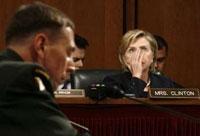Rudy Giuliani and Hillary Rodham Clinton have secrecy issues
The front-runners in national polls for their parties' nominations both are grappling with disclosure controversies as they seek to succeed President George W. Bush, known as one of the most secretive chief executives in modern history.

For the Republican former New York mayor, the primary issue is Giuliani Partners, the consulting business he formed when he left City Hall. He still works for the firm but will not shed light on its business dealings or release a client list. He is not required to; the company is privately held.
"It isn't mysterious at all," Giuliani insists, arguing that the media has identified clients.
He is also battling - and dismissing - suggestions that security expenses for extramarital liaisons with Judith Nathan, who is now his current wife, were hidden in little-known city accounts. And, he is facing criticism for the handling of his mayoral records.
Clinton, the Democratic New York senator and former first lady, is taking heat over locked-away correspondence between President Bill Clinton and her during their White House years. She often cites her experience in her campaign, and rivals argue she should expedite the opening of those records to allow her experience to be evaluated, particularly on health care policy.
She says the National Archives, which has custody of the records, "is moving as rapidly as the Archives moves." Her husband said last week: "I'm not trying to cover anything up."
A direct comparison between the Giuliani and Clinton situations is difficult.
"There's a concern on the part of Giuliani about his behavior, a man known relatively little to the public except in flashes of post-9/11 take charge," said Thomas Mann, a political analyst at the Washington-based Brookings Institution. "There are real questions about his probity, his choice of associates and potential conflicts of interest given the extraordinary amount of business he's done since leaving office and that touches on government policies."
"With Clinton, it's a bit of a muddle," Mann said. "It's appropriate that presidential documents be released and made public as soon as possible. It's a reasonable question to be raised," he said. But, he added: "It's not like there's necessarily some crucial information in there that's not being revealed."
Still, both candidates face lack-of-disclosure questions - just five weeks before voting begins and as the electorates strongly value honesty and ethics.
A recent national survey by The Associated Press and Yahoo News found that both Democrats and Republicansrated those two issues as very important or extremely important qualities in a presidential candidate more often than any other trait measured.
Neither Clinton nor Giuliani was seen as particularly honest or ethical. Just 38 percent viewed Clinton as honest, while just 40 percent called her ethical. Forty-two percent called Giuliani honest, 40 percent ethical.
Secrecy questions about them could give voters pause - particularly after seven years of Bush's behind-the-curtain approach that included covert CIA prisons, warrantless wiretapping and classified memos on interrogation techniques.
Generally, a president prone to secrecy can have long-term implications for a democracy.
"The effect is sort of an imperialistic presidency that's unchecked," said Anne Weismann, chief counsel of Citizens for Responsibility and Ethics in Washington. With Bush, she said: "We're pretty far down that road, but I don't think we're there yet." However, she added, given the outcry over Bush's actions, "It's hard to imagine a president that will follow in that same course."
Giuliani laughed, then grew agitated, when the AP asked recently whether he would ever outline his role with his firm or release a thorough client list. "Everything I did at Giuliani Partners was totally legal, totally ethical," he said. "There's nothing for me to explain about. We acted honorably, decently."
The media have unearthed some client names that show his firm represents or has represented airlines, energy companies and communications businesses. One client, Purdue Pharma L.P., makes the controversial painkiller OxyContin.
Separately, Giuliani has called reports that he charged security expenses to obscure city offices as his affair began "a typical political hit job with only half the story told." He also has dismissed criticism over the 2,000 boxes of his mayoral documents temporarily going to a private foundation his supporters ran and financed to be copied and archived.
Clinton, for her part, rejects charges that she has been secretive about her own documents. This month in Iowa, she said: "My husband has not withheld a single document."
But, like some of his predecessors, Bill Clinton had the power to limit what records the National Archives could immediately make public. In a 2002 letter, he wrote he did not want the agency to release communications between the first lady and him for 12 years after leaving office.
"We're not trying to hold up anything," he told C-SPAN last week. "We're getting this stuff out as soon as we can."
Subscribe to Pravda.Ru Telegram channel, Facebook, RSS!





